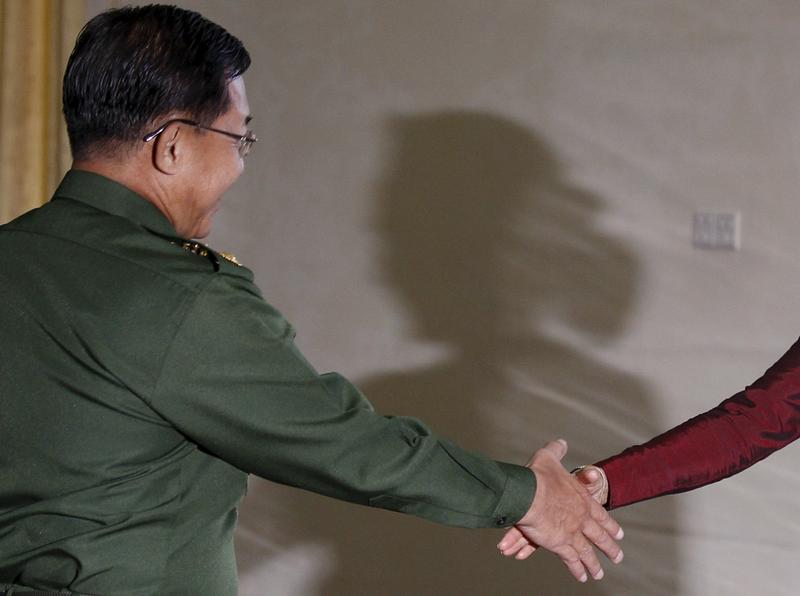State Counsellor Aung San Suu Kyi reaffirmed her administration’s commitment to the Nationwide Ceasefire Agreement at the second anniversary of the pact’s signing on Sunday, while Burma’s commander-in-chief urged NCA holdouts to get on board and the leader of the most prominent ethnic armed signatory to the accord acknowledged doubts about the peace process.
General Mutu Sae Poe of the Karen National Union (KNU) delivered a speech on behalf of NCA signatories at a ceremony marking the agreement’s two-year birthday on Sunday, saying, “Although the NCA lays a foundation for political dialogue to take place, we need to recognise that the peace process still faces challenges and weaknesses.”
He continued, “There are obstacles in carrying out operations at various levels of the Joint Monitoring Committee, as state-level Joint Monitoring Committees have not been established in some of the regions of the signatories. The Union Peace Dialogue Joint Committee, which oversees the political dialogue, also has some weaknesses. The ‘Framework for Political Dialogue’ has not been reviewed and finalised. Also, some signatories have not been able to hold political dialogues in their respective states.”
The NCA was signed by representatives of the previous government, military and eight non-state armed groups on 15 October 2015. Suu Kyi, then the country’s opposition leader, notably did not attend the 2015 ceremony. About a dozen other ethnic armed groups have abstained from signing to date, or have been denied the opportunity to do so.
Khun Okka, patron of the signatory Pa-O National Liberation Organization, said the NCA’s most significant benefit for signatories was the opportunity to discuss their political goals and policy proposals with the government and Burma’s armed forces. He, nonetheless, echoed Mutu Sae Poe in pointing out shortcomings with regard to the agreement’s implementation over the past two years.
“During the period, there were some delays. After the new government came to power, we worked with them. The new administration has its own issues, problems and agendas. We could not progress for about six months,” said Khun Okka.
“During the first year of collaborating with them, the government worked steadfastly, but they do not have sufficient human resources. In the meantime, they also had to lure non-signatories into the fold. They had to devote some time to that. They prioritised getting more groups to sign. It was time-consuming, but we understand that.”
Suu Kyi also attended Sunday’s ceremony, saying preparations are underway for the third iteration of the Union Peace Conference under her watch, to be held by year’s end.
At that high-level forum, which she has alternatively dubbed the 21st Century Panglong Conference, the state counsellor said: “We will need to continue our dialogue on the division of power, allocation of resources and revenue between the Union, states and regions, and the powers as described in the additional tables to the Constitution. These are about how we will divide our state powers in our future federal Union. If we are able to conclude the discussion on fundamental principles during the upcoming sessions of the peace conference, we would have a strong foundation for the federal Union.”
She added: “We all agree that a federal system is the only solution for the internal armed conflict that has gone unresolved under successive governments.”
Taking a more combative tone, Senior-General Min Aung Hlaing, the country’s commander-in-chief, said those abstaining from signing the NCA were “resisting the federal Union which people aspire to, opposing democracy, having desire for armed ‘anarchy,’ and disregarding the interests of the Union and its people,” according to a translation of his speech printed in the state-run Global New Light of Myanmar.
[related]
The NCA ostensibly lays out a pathway to peace between the Burma Army and the country’s myriad ethnic armed groups. It was signed in October 2015 under the government of then-President Thein Sein, whose military-back Union Solidarity and Development Party (USDP) was soundly defeated by Suu Kyi’s National League for Democracy in a general election less than a month after the NCA was inked.
Though she did not join the NCA signing ceremony in 2015, Suu Kyi has increasingly embraced signatory status as a pre-requisite for a formal seat at the negotiating table as Burma’s peace process moves forward, a stance set out by the USDP government that hers succeeded.
“I want to request of national ethnic groups who have not signed yet the ceasefire treaty to sign with bravery and self-confidence,” she said in February, at an event marking Union Day.



